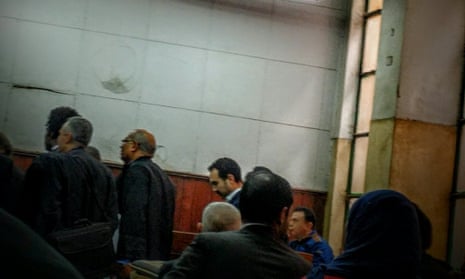The Egyptian author Ahmed Naji has been given a two-year prison sentence for “violating public modesty” after publishing a book with references to sex and drugs.
Ramy Yaacoub, a political analyst and friend of the defendant, tweeted a picture of Naji bowing his head in the darkened courtroom as his case was fought. The ruling was initially overturned in January, but after an appeal by the prosecution the case returned to court and Naji was given the maximum possible sentence on Saturday.
An Egyptian citizen brought charges against the author after an except of his novel The Guide for Using Life was published in the magazine Akhbar al-Adab. The editor of the magazine, Tarek El Taher, was also given a fine equivalent to £885.
The plaintiff claimed that reading the sexually explicit material, which also mentions smoking hashish, caused him to become ill after his blood pressure dropped and his heartbeat fluctuated.
Naji had previously said that The Guide for Using Life had been approved by the Egyptian censorship board.
“They didn’t consider the constitution at all, which says you can’t jail artists,” said Naji’s lawyer Mahmoud Othman. “Article 67 of the constitution states this, and the constitution trumps all.”
Naji was detained in court and remained in custody as the preparations began for his appeal. Asked about the likely success of the appeal, Othman responded: “We hope the judiciary will respect the constitution so it’s not just ink on paper.” Yaacoub later tweeted that Naji was in good spirits as he prepared for prison.
“Today’s verdict is a travesty for freedom of expression and justice more broadly. It comes in the context of a broader crackdown which has brought us the detention of academics at airports, the harassment of cartoonists for their artwork, and the raiding of publishing houses,” said Mai El-Sadany, a non-resident fellow for legal and judicial analysis at the Tahrir Institute for Middle East Policy.
Sadany argued that Naji’s sentence contravened domestic and international law, including article 67 of the Egyptian constitution and article 19 of the international covenant on civil and political rights. “It is beyond me how a man can be sentenced for exercising his artistic freedom, while police officers who torture detainees are left to act with impunity,” she said.
